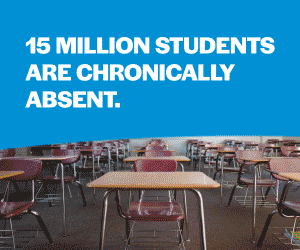 Eighth grader, Leona Wright, 13, holds her hand up high during a group exercise during Konnection Klub at Durfee Elementary-Middle School on Thurs., Oct. 19, 2023 in Detroit. The program is an example of how community groups are already trying to help improve student attendance in the city. (Elaine Cromie / Chalkbeat)
Eighth grader, Leona Wright, 13, holds her hand up high during a group exercise during Konnection Klub at Durfee Elementary-Middle School on Thurs., Oct. 19, 2023 in Detroit. The program is an example of how community groups are already trying to help improve student attendance in the city. (Elaine Cromie / Chalkbeat)
Researchers Sarah Winchell Lenhoff and Jeremy Singer have been studying chronic absenteeism in Detroit for years, talking to scores of parents, students, educators, and school administrators along the way, and keeping track of many school efforts to reduce absenteeism.
One thing they’ve learned during that time is that no matter how much passion schools put into solving the chronic absenteeism problem, they may be fighting a losing battle. That’s because while chronic absenteeism “is a problem for schools,” it’s not a problem that can be solved by schools.
Their new book, “Rethinking Chronic Absenteeism: Why Schools Can’t Solve it Alone,” which was released Tuesday by Harvard Education Press, explains why and provides a road map for what they describe as an “ecological” instead of an “educational” approach to addressing chronic absenteeism.
Why? Because poverty weighs heavily into the reasons students miss school, particularly in communities like Detroit where the overwhelming majority of students come from low-income homes.
Chronic absenteeism has been a problem in Detroit for years and is also affecting school districts across Michigan. Statewide, nearly 30% of students were considered chronically absent, meaning they missed 10 or more days of school, during the 2023-24 school year, according to state data. In the Detroit Public Schools Community District, the rate was nearly 66%. Many charter schools in the city also have high rates of chronic absenteeism.
The pandemic fueled a surge in chronic absenteeism, though rates have since decreased.
The book has a number of recommendations for policymakers, school and district leaders, and community-based organizations and coalitions.
“I hope that folks outside of education pick up the book and think yes, there’s a role for me in health, or for me in housing, for me in transportation, or for me as a lawmaker,” said Singer, an assistant professor of educational leadership and policy studies at Wayne State University.
For policymakers, who have the power to legislate change, the authors recommend they substantially increasing efforts to reduce poverty, eliminate punishments for schools and students for chronic absenteeism, invest in systems to ensure students have the resources they need, and reduce the emphasis on chronic absenteeism within school accountability systems.
Lenhoff said she hopes the book will shatter stereotypes people may have that children who are chronically absent aren’t motivated to attend school and that their parents don’t care.
“Detroit parents want their kids in school,” said Lenhoff, the Leonard Kaplan Endowed Professor and an associate professor of educational leadership and policy studies at Wayne State. “Many parents, even parents who have kids with really good attendance, are going to extremely great lengths to get their children to school, coordinating all kinds of different resources and backup transportation.”
Lenhoff and Singer lead the Detroit Partnership for Education Equity & Research, or Detroit PEER, with Lenhoff as its director and Singer as its associate director.
Read the full Q&A with the authors on Chalkbeat.




























